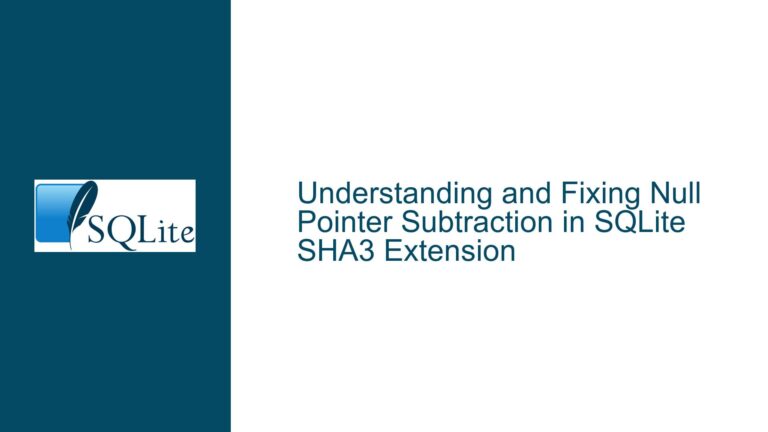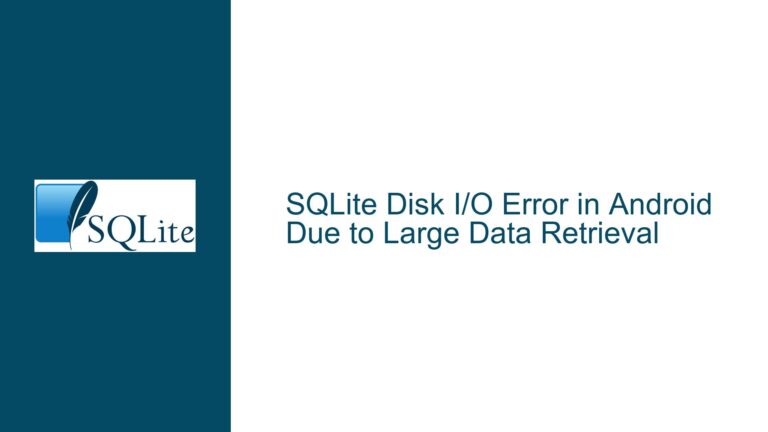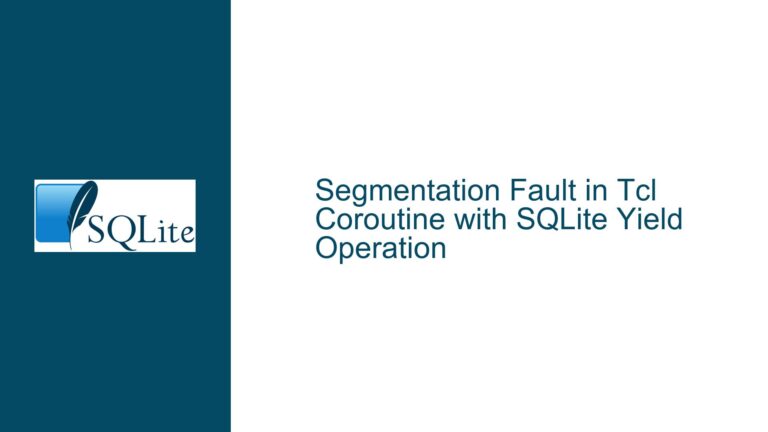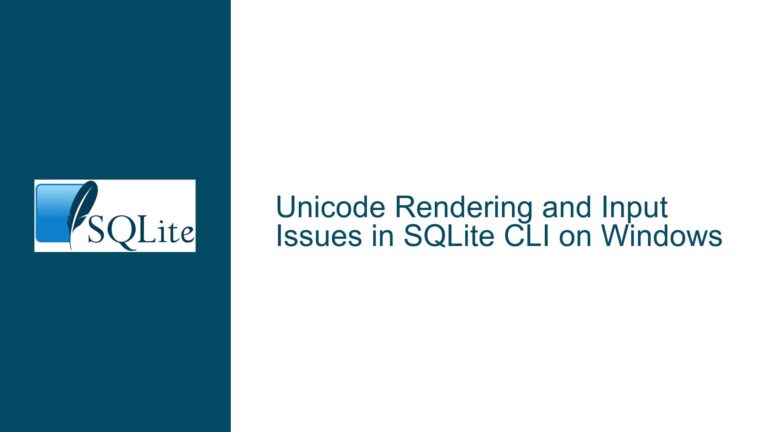Resolving XML Extension Challenges in SQLite: Namespace Conflicts and XPath Query Errors
Understanding Limitations of XML Namespace Handling in SQLite Extensions
Issue Overview
The core challenge revolves around using XML data within SQLite via custom extensions, particularly when processing documents that leverage XML namespaces or require precise XPath query syntax. A user-developed extension utilizing the pugixml library exposes two critical pain points:
- Namespace Unawareness: The pugixml library does not inherently support XML namespaces, leading to incorrect or incomplete parsing of documents that rely on namespace-qualified elements (e.g., SVG, XHTML, OfficeXML). This results in queries failing to retrieve data from elements prefixed with namespace identifiers.
- XPath Syntax and SQL Integration Errors: Users attempting to extract data via
xml_extractorxml_eachencounter SQL errors due to improper subquery formatting, incorrect XPath expressions, or misalignment between stored XML content and query logic. For example, a query likeselect xml_extract(select ...)fails because scalar functions cannot directly consume subqueries without encapsulation via CTEs or temporary tables.
The discussion highlights a gap between expected XML processing behavior (namespace resolution, hierarchical traversal) and the practical limitations of lightweight libraries like pugixml. Additionally, the learning curve for XPath syntax and SQLite’s function invocation rules exacerbates user frustration, especially when migrating from JSON-centric workflows.
Root Causes of Namespace Conflicts and XPath Misinterpretation
Possible Causes
- Library Constraints: Pugixml treats namespace prefixes (e.g.,
<ns:element>) as literal part of element names rather than resolving them to URIs. Queries targeting//ns:element/text()will fail unless the XML is preprocessed to strip namespaces or the XPath explicitly uses the literal prefix. - Subquery Misapplication: SQLite scalar functions like
xml_extractrequire a single XML string as input. Directly embedding aSELECTsubquery (e.g.,xml_extract(select ...)) violates SQL syntax rules, which mandate using subqueries inFROMclauses or CTEs. - XPath Context Errors: Users often omit axis specifiers or node type checks. For example,
//ITEMIDmight resolve to element nodes, but accessing their text requires/text(). Without this,xml_extractreturns empty values or structural XML fragments instead of text. - Data Import Artifacts: Importing XML via PowerShell or external tools may introduce encoding mismatches or unintended whitespace, causing parsing failures. The example
inventory.xmlimport usesexec('powershell ...'), which risks adding BOMs or line breaks that pugixml might reject.
Resolving Namespace Issues and Optimizing XPath Queries
Troubleshooting Steps, Solutions & Fixes
1. Mitigating Namespace Limitations
- Manual Namespace Stripping: Preprocess XML to remove namespace declarations before storage. Use regex replacement in SQLite:
UPDATE xmlData SET xml = REPLACE(xml, '<ns:', '<') , xml = REPLACE(xml, '</ns:', '</');This simplifies XPath queries to
//elementwithout prefixes. - XPath Predicate Workarounds: Query elements by local name ignoring namespaces using
local-name(). For example:xml_extract(xml, '//*[local-name()="ITEMID"]/text()')This bypasses prefix resolution but requires precise knowledge of element names.
2. Correcting SQL Function Invocation
- CTE Encapsulation: Always pass XML data to scalar functions via CTEs or joins:
WITH source AS (SELECT xml FROM xmlData WHERE file = 'inventory.xml') SELECT xml_extract(xml, '//ITEMID/text()') FROM source; - Table-Valued Function Joins: Use
xml_eachwith explicit joins for row-wise extraction:SELECT x.value FROM xmlData, xml_each(xmlData.xml, '//ITEMID/text()') AS x WHERE file = 'inventory.xml';
3. XPath Syntax Refinement
- Explicit Text Node Selection: Append
/text()to XPath expressions to extract text content instead of elements:xml_extract(xml, '//ITEMID/text()') -- Returns "2397" - Avoid Ambiguous Axis Queries: Prefix paths with
.//to scope searches relative to the root:xml_extract(xml, './/INVENTORY//ITEMID/text()')
4. Data Import Sanitization
- Normalize Encoding: Use
-Rawin PowerShell to prevent line break insertion:CREATE TABLE xmlData AS SELECT line AS file, exec('powershell Get-Content c:\xml-import\' || line || ' -Encoding UTF8 -Raw') AS xml FROM exec('powershell Get-ChildItem -Path c:\xml-import\ -Name'); - Validate XML Post-Import: Run
xml_valid(xml)checks after import to catch parsing errors:SELECT file FROM xmlData WHERE xml_valid(xml) = 0; -- Identify invalid entries
5. Extension-Specific Optimizations
- Recompile with Namespace Support: Modify the pugixml build flags to include
PUGIXML_NO_XPATH(if possible) to reduce overhead, though this won’t enable namespace awareness. Consider switching to a namespace-aware parser like libxml2, though this complicates dependency management. - Custom Function Wrappers: Implement SQLite functions that preprocess XPath queries to replace namespace prefixes with wildcards:
// In xml.cpp extension code: static void xml_extract_ns(sqlite3_context* ctx, int argc, sqlite3_value** argv) { std::string xpath = ...; replace(xpath, "ns:", "*:"); // Convert ns: to *: for prefix-agnostic queries // Execute modified XPath... }
6. Debugging Complex Documents
- Incremental XPath Testing: Use
xml_eachto iteratively test path components:-- Check if ITEM elements are detectable: SELECT count(*) FROM xml_each(xml, '//ITEM'); -- Then drill down into ITEMID: SELECT value FROM xml_each(xml, '//ITEM/*[1]'); - Namespace URI Mapping: For documents using default namespaces (e.g.,
xmlns="http://..."), redefine prefixes manually in XPath:xml_extract(xml, '//*[namespace-uri()="http://example.com/ns" and local-name()="ITEMID"]/text()')
By addressing namespace handling through preprocessing and XPath adjustments, refining SQL function usage via CTEs, and validating data imports, users can overcome the majority of issues discussed. Persistent attention to XPath specificity and library limitations ensures reliable XML processing within SQLite’s constraints.






